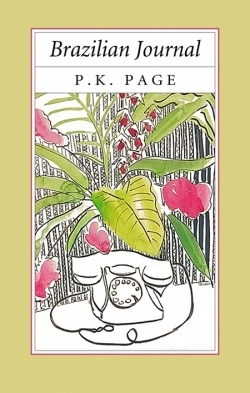Brazilian Journal
- 2011 INDIES Winner
- Gold, Autobiography & Memoir (Adult Nonfiction)
There is an irony to moving: while the primary change seems to be an external one, it is often the subtle, internal one that is the most profound. The more exotic the locale, the more exotic the inner change. Canadian poet P.K. Page tracks the course of this transformation in her book Brazilian Journal. In 1957, Page moved to Brazil with her husband, where he was assigned as Canadian ambassador. Loathe to move there at first, she is slowly drawn in by Brazil and soon comes to love it. Gradually, a change takes place. While a writer by trade, Page begins to gravitate towards the visual, becoming entranced by Brazil’s natural beauty, eventually turning from poetry to drawing and painting in an effort to capture her surroundings.
Despite being seduced by the outer world, Page’s journal entries remain rich in observation. Each page luxuriates in description of the nature—an insect with “black lace wings and a green brocade head and a noise like a DC-3 revving up” finds its way into Page’s bedroom, the world “throbs” with green, and a “wild palm leggy as colts” appears before her on a bay. Most of Page’s entries are filled with this kind of reverent, indulgent description, roping the reader in and making Brazil’s beauty visceral. In fact, Page’s writing is often observational at the expense of the personal—the reader rarely, if ever, is allowed into her inner life, though this doesn’t mean it isn’t there. Indeed, Page, who passed away in 2010, apparently excised many of her more reflective passages while preparing to publish her journals, choosing to edit out some of her darker thoughts about Brazil and about her inability to write poetry.
There are certain passages that make the reader chafe, including ones in which Page complains about lazy servants, and uses outdated, racially charged language. She also makes observations about Brazil’s prejudiced, divided society, which, while uncomfortable, serve to capture Brazil’s complexity. Nonetheless, despite being very much a product of her time, Page adjusts to the strange new environment with poise, and it is clear that something about Brazil makes Page feel more alive. “Something mad is happening to me,” she writes. “I seem to be falling in love with the world. And something in me is afraid. It is hard to know joy from pain—just as it is hard to know hot water from cold, if either is hot or cold enough.” Anyone who has gone somewhere new and has been touched profoundly by the place will be able to relate to Page.
Brazilian Journal should appeal to a wide array of readers. Poets, naturalists, language enthusiasts, and fans of Page’s work alike will enjoy, and perhaps be awakened by it.
Reviewed by
Lia Skalkos
Disclosure: This article is not an endorsement, but a review. The publisher of this book provided free copies of the book and paid a small fee to have their book reviewed by a professional reviewer. Foreword Reviews and Clarion Reviews make no guarantee that the publisher will receive a positive review. Foreword Magazine, Inc. is disclosing this in accordance with the Federal Trade Commission’s 16 CFR, Part 255.

